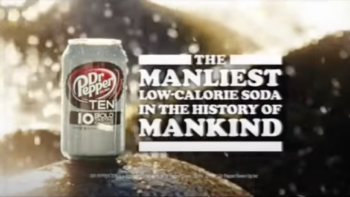 By Deni Baird, special to the Chronicle
By Deni Baird, special to the Chronicle
It is the late 2000s and my mom has just gotten home from her all-female football league, and my dad is finishing up the Atlanta Falcons football game against a conference rival.
I am patiently waiting to turn our beloved box television to Nickelodeon for reruns of “Avatar: The Last Airbender” when the newest Dr. Pepper ad airs across the screen.
Filled with wild adventures and serene landscapes the commercial concludes with the tagline, “It’s Not For Women.” This is an ad campaign that perplexed me for nearly a decade as someone who was brought up in a traditional, yet gender non-conforming, household.
Surprisingly, the primary reason for this campaign is not as blatantly sexist compared to the typical 2000s tagline. Back then, men were not as interested in low-calorie sodas, but why?
Low-calorie, “better for you” soft drinks did not appear “manly” enough. The marketing team for Dr. Pepper aimed to corner this new target audience for the low-calorie drink.
 Brands still do this today, from Coke Zero to probiotic sodas that place the words “Pro gut health!” or “Better for you” on their packaging. This particular target audience seemed to have been reached successfully for about 10 years before disappearing around the beginning of the COVID-19 pandemic in 2020.
Brands still do this today, from Coke Zero to probiotic sodas that place the words “Pro gut health!” or “Better for you” on their packaging. This particular target audience seemed to have been reached successfully for about 10 years before disappearing around the beginning of the COVID-19 pandemic in 2020.
I grew up in a rather genderless house – not intentionally, but it coincided with the change in social and cultural norms in the United States. The way I perceived the ad as a pre-teen was similar to the journalists covering the campaign. I couldn’t figure out why uplifting men’s health meant putting everyone else’s down.
As a politically active member of society who drives a Subaru Outback, and attended multiple Bernie Sanders rallies in my youth, I have been accurately stereotyped more times than I can count. I view it as harmless, as none of the stereotypes have stopped me from getting a job, being accepted into a school, or interfering with my everyday life. However, campaigns that isolate women/non-male audiences do not seem like risks worth taking in advertising. Gender-based stereotypes have interfered with my everyday life and contributed to hindering me from joining “boy’s sports” during the same time the ad was airing.
Stereotypical marketing still brings in money, as we collectively observe year after year the “pink tax,” a strategy that allows companies to charge more for items marketed directly to women.
Gender in advertisements has proven to be successful when it is not being used against any one gender. During the 2024 NCAA Women’s Basketball Tournament, Dove and Nike debuted their “#KeepHerConfident” campaign, a community-based approach to keep preteen girls from dropping out of sports over body confidence challenges by encouraging communication between guardians and coaches surrounding puberty. Ten years prior, Always, a P&G company, launched their ‘#LikeAGirl” campaign that emphasized a societal approach to keeping young girls in sports by erasing the stigma around the outdated phrase. Both campaign messages were rooted in uplifting young women, without pressing down on anyone else.
I do not think the “It’s Not For Women” Dr. Pepper ad would do well in the 2020s. I do not remember it doing great numbers when it came out, either. Stereotypes can be lighthearted based on the perception and boundaries of the people on the other end, I think Dr. Pepper looked past this point. This campaign is reminiscent of Burger King’s “Women Belong in the Kitchen” campaign aimed at inspiring female chefs. Both, I feel, missed the mark. Harmful stereotypes are still used today, and still fuel discriminatory actions – using them for playful ad campaigns might have intentions to bring light-heartedness to them, but when both sides are laughing, one side is still winning.





Comments